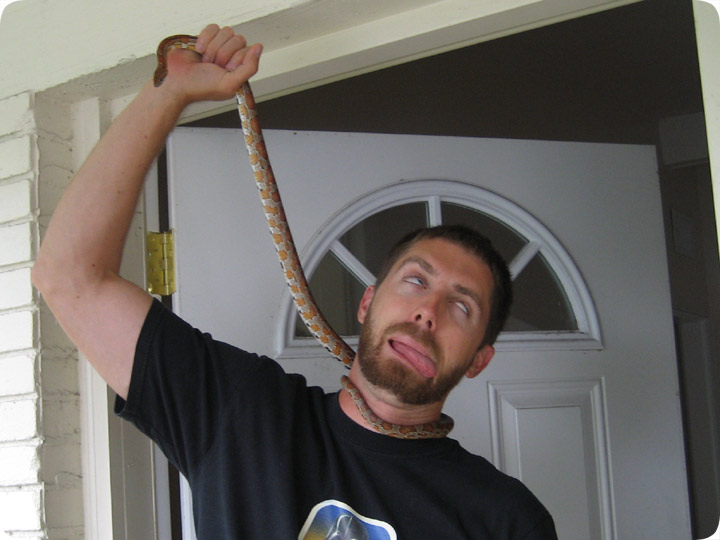-
info@aaanimalcontrol.com
Call us for help in your town
Humane Wildlife Education
America's Deadliest Snake - Most Dangerous Snakes

03.05.2007 - Behold! The most dangerous snake in America! The rare Hangman's Snake (constrictus dangleus). It sneaks up on you from behind, latches itself around your neck, and then forces you to choke yourself to death! Sometimes this species
gives you a chance to spell out a mystery word, but if you fail to guess the correct letters and solve the puzzle, it attacks. If you spot this snake, stay calm and turn and walk the other way. It primarily lurks around gallows and lynching trees, so beware
when entering these habitats. Should you find yourself amidst an attack from a Hangman's Snake, resist the urge to pull upward, if you can, and then have a friend tell you to
quit messing around and leave the poor harmless Corn Snake alone. That's what I did, which is why I survived.
The actual dangerous snakes in America execute not
via hanging, but lethal injection. The true answer to which species of snake is America's most deadly is the Eastern Diamondback Rattlesnake.
But the true true answer is "An Eastern Diamondback that you are dumb enough to try to get
near, for any reason". Because the truth of the matter is that no snakes in America simply attack for no reason, or even by accident. Pretty much every single case of a snakebite in America occurs when people attempt to catch, or kill, snakes. So you see
it's pretty much the people who are hanging themselves. Snakes don't lie in wait to attack you, and if you get near, I guarantee that not a single snake in America will move toward you with any intent of an interaction. Every snake will try to go the other
way, because YOU are the actual predator. Even the big, tough, venomous snakes will not approach you. Yes, they will often hold their ground if they feel cornered and know it's their last means of self defense, but no snakes intend to
aggressively attack.
I
once approached a gigantic 5' Cottonmouth that almost surely could have delivered a lethal bite, and I couldn't get to within ten feet of it when it desperately turned tail and
slithered away from me out of fear. But if you corner a snake and it can't get away,
and you try to kill it with shovel or gun or whatever, that's when almost all bites occur. So please, just leave snakes alone! If you attempt to catch or kill them for your own "safety", you are essentially doing what I'm doing in the above photo.
Do it yourself: Visit my How To Get Rid of Bats page for tips and advice.
Get professional help: Visit my Nationwide Pro Directory of wildlife and snake removal experts.
For more wildlife stories, click my Wildlife Blog
or click my below banner to hire a local trapper.
The cottonmouth
Sometimes called a water pit viper, the cottonmouth is semi-aquatic, meaning it lives half in water. It's a very strong swimmer and has even been reported to cross oceans.
The cottonmouth has very powerful cytotoxic venom, strong enough to strip away flesh! Because they hide underwater, attacks are quite frequent. Thankfully though we do have an antidote so deaths are quite rare.
Timber rattlesnake
Timber rattlesnakes are extremely dangerous, their fangs are strong enough to pierce boots and their venom can kill in 4 - 48 hours depending on how much venom the snake decides to use. They can pump a huge amount of venom into their victims. But they are quite calm and docile and will rattle strongly before attacking, so whilst antivenin must be administered within 2 hours of a bite, bites are quite rare.
The tiger rattlesnake
The tiger rattlesnake is named after its stripes but like tigers, this is a fierce pouncer and will kill readily. Whilst it's venom is so toxic that it's more dangerous than any other snake in the western hemisphere, it doesn't pump that much into its victims per bite.
Burmese python
The Burmese python shouldn't be an American snake but due to importation and breeding, these highly dangerous snakes are prevalent in Florida. In fact, Florida offers a large reward to python hunters. To illustrate the power of these constrictor snakes (snakes that kill by wrapping around their victim and squeezing rather than by venom), in 2018, a Burmese python ate a man in Africa! In 2020 another Burmese python ate a woman, both were swallowed whole! However, attacks on humans from Burmese pythons are rare.
Eastern coral snake
At any one time, a coral snake has enough venom to kill five people! Its venom can kill in two hours, although it rarely injects quite that much. It is one of the most poisonous snakes in the world but it doesn't hunt humans, biting only in defense which means it usually doesn't put much venom in each bite. Did you know that baby coral snakes are far more dangerous than adult coral snakes? That's because they can't control how much venom they inject, unlike adults.
The western diamondback
The western diamondback is the opposite of the tiger snake. Its venom is quite weak but it pumps so much venom into each bite that it's very dangerous. In fact, the western diamondback is responsible for the most snake deaths in Mexico and is second only to the eastern diamondback in the United States.
Whenever you spot a snake, it's important to check if it's dangerous or not. Whilst many snakes are harmless, you shouldn't take chances. Never antagonize a snake and if you do need snakes removed from your property, call a wildlife removal expert.




















